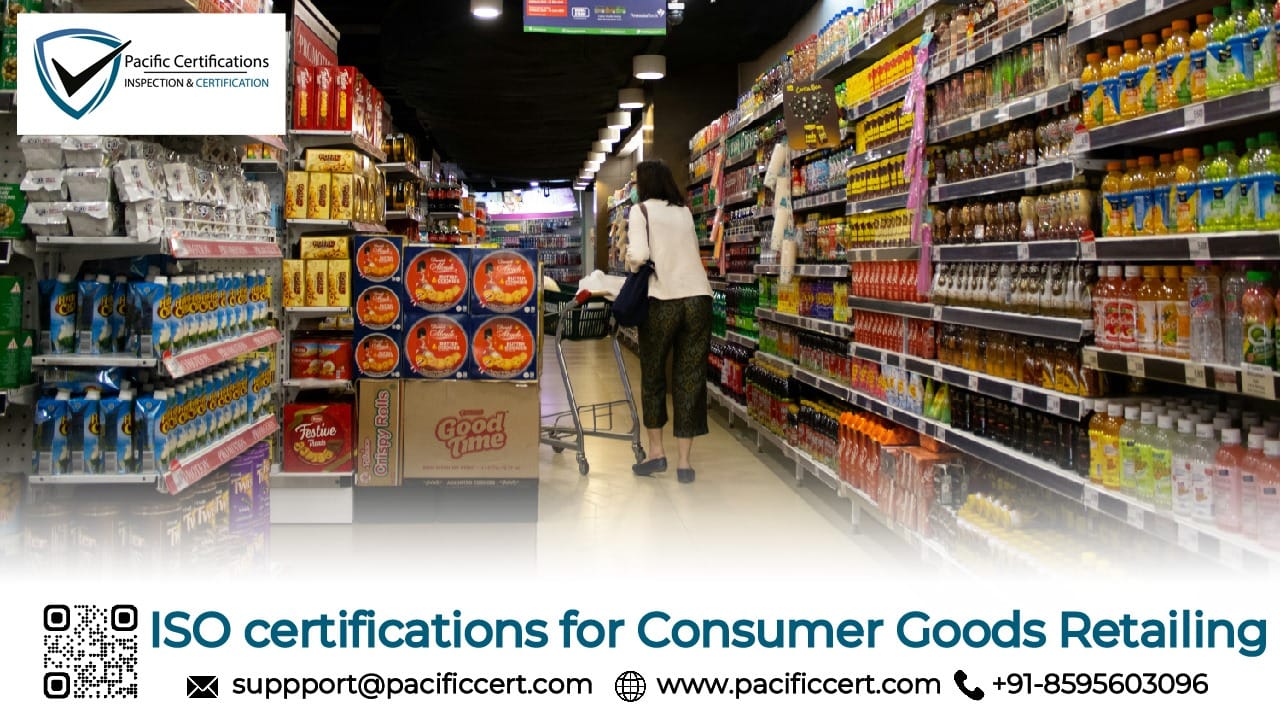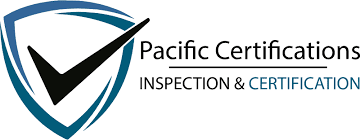ISO Certifications for Consumer Goods Retailing Businesses, Requirements and Benefits

Introduction
In today’s ever-changing retail world, consumers expect more than ever before. Quality, safety, and environmental responsibility aren't just buzzwords; they are essential expectations. This means businesses in the consumer goods retail sector need to keep up and adapt to these growing demands. One powerful way to show you’re serious about meeting these standards is by obtaining ISO certifications.
ISO standards provide clear guidelines to ensure the quality, safety and efficiency of products and services across various industries. For those in consumer goods retail, ISO standards are especially important.
They help businesses navigate complex supply chains, boost customer satisfaction and streamline overall operations. Whether you run a small boutique or manage a large retail chain, following ISO standards can greatly enhance your business’s reputation.
Connect with us today for ISO certification services in Consumer Goods Retailing by emailing [email protected] or calling +91-8595603096.
Applicable ISO Standards for Consumer Goods Retailing
Consumer goods retailing spans a wide range of products, from food and beverages to electronics, clothing, and household items. With this diversity, several ISO standards come into play, each focusing on different aspects of the retail process. Below are some of the most relevant ISO standards for consumer goods retailing:
ISO 9001: Quality Management Systems
ISO 9001 is one of the most recognized ISO standards worldwide, offering a framework for a Quality Management System (QMS). It helps businesses maintain consistent quality in their products and services, leading to higher customer satisfaction and improved operational efficiency.
ISO 14001: Environmental Management Systems
ISO 14001 provides the guidelines to set up an Environmental Management System (EMS). It helps businesses minimize their environmental impact. Retailers adopting ISO 14001 can show their dedication to sustainability and attracting eco-conscious customers.
ISO 45001: Occupational Health and Safety Management Systems
The retail sector involves a variety of activities that could pose risks to employee health and safety. ISO 45001 offers a framework for managing these risks, ensuring a safe working environment.
ISO 22000: Food Safety Management Systems
For retailers handling food products, ISO 22000 is crucial. This standard lays out the requirements for a Food Safety Management System, that helps businesses identify and control food safety hazards.
ISO 27001: Information Security Management Systems
ISO 27001 offers a framework for establishing an Information Security Management System to protect sensitive customer and business data.
ISO 50001: Energy Management Systems
ISO 50001 provides a framework for managing energy use more effectively. Retailers that implement ISO 50001 can cut down on energy consumption, reduce operational costs and contribute to environmental sustainability.
Click here to find out more applicable standards to your industry
Looking to get ISO certified in Consumer Goods Retailing? Reach out to us at [email protected] or call +91-8595603096.
How We Can Help?
At Pacific Certifications, we specialize in providing certification services for a wide range of ISO standards. As a trusted certification body, we guide your business through the entire audit and certification process ensuring compliance with the relevant ISO standards.
Our role is focused on auditing and certification. We do not provide consultancy or implementation support. Instead, we offer an objective assessment of your management systems to determine whether they meet the requirements of the ISO standards you wish to achieve.
Here’s how we can help:
- Audit Services: Our experienced auditors will conduct a thorough examination of your management systems to assess compliance with the relevant ISO standards.
- Certification Issuance: Upon successful completion of the audit, we will issue the ISO certification, confirming that your business meets the required standards.
- Surveillance Audits: To maintain certification, we will conduct yearly audits to ensure that your management systems continue to comply with ISO standards.
For reliable ISO certification in Consumer Goods Retailing, contact our team at [email protected] or +91-8595603096.
Requirements of ISO Certifications for Consumer Goods Retailing
The requirements of ISO standards, particularly for ISO 9001, ISO 14001, ISO 45001 etc, are designed to help organizations establish, implement, maintain, and continually improve their management systems. Below is an overview of the key requirements for each of these standards:
ISO 9001: Quality Management Systems Requirements
Context of the Organization:
- Understanding the organization and its context.
- Understanding the needs and expectations of interested parties.
- Determining the scope of the QMS.
- Establishing a QMS based on these factors.
Leadership:
- Demonstrating leadership and commitment to the QMS.
- Establishing a quality policy.
- Defining organizational roles, responsibilities, and authorities.
Planning:
- Addressing risks and opportunities.
- Setting quality objectives and planning to achieve them.
- Planning changes to the QMS.
Support:
- Providing necessary resources.
- Ensuring competence of personnel.
- Awareness of the QMS.
- Controlling documented information (documentation and records).
Operation:
- Planning and controlling production or service provision.
- Requirements for products and services.
- Designing and developing products and services.
- Controlling externally provided processes, products, and services.
Performance Evaluation:
- Monitoring, measurement, analysis, and evaluation.
- Conducting internal audits.
- Reviewing management processes.
Improvement:
- Addressing nonconformities and taking corrective action.
- Continually improving the QMS.
ISO 14001: Environmental Management Systems Requirements
Context of the Organization:
- Understanding the external and internal issues affecting the EMS.
- Identifying the needs and expectations of interested parties.
- Defining the scope of the EMS.
Leadership:
- Commitment to environmental management by top management.
- Establishing an environmental policy.
- Assigning responsibilities and authorities for environmental management.
Planning:
- Identifying environmental aspects and impacts.
- Addressing compliance obligations (legal and other requirements).
- Setting environmental objectives and planning to achieve them.
- Planning actions to address risks and opportunities.
Support:
- Providing the necessary resources for the EMS.
- Ensuring competence and awareness related to environmental management.
- Communicating relevant environmental information.
- Controlling EMS documentation and records.
Operation:
- Planning and controlling operations that can impact the environment.
- Establishing emergency preparedness and response procedures.
Performance Evaluation:
- Monitoring, measuring, and evaluating environmental performance.
- Conducting internal audits of the EMS.
- Reviewing the EMS at the management level.
Improvement:
- Addressing nonconformities and taking corrective actions.
- Continually improving the EMS.
ISO 45001: Occupational Health and Safety Management Systems Requirements
Context of the Organization:
- Understanding the organization’s context related to occupational health and safety (OHS).
- Identifying interested parties and their needs.
- Defining the scope of the OHSMS.
Leadership:
- Leadership and commitment to OHS by top management.
- Establishing an OHS policy.
- Defining roles, responsibilities, and authorities in the OHSMS.
Planning:
- Identifying hazards and assessing risks and opportunities.
- Determining legal and other OHS requirements.
- Setting OHS objectives and planning to achieve them.
Support:
- Providing necessary resources for OHS.
- Ensuring competence and awareness among employees.
- Establishing effective communication for OHS.
- Controlling documented information.
Operation:
- Planning and controlling operational processes that could lead to risks.
- Managing changes affecting OHS.
- Preparing for and responding to emergency situations.
Performance Evaluation:
- Monitoring, measuring, and evaluating OHS performance.
- Conducting internal audits of the OHSMS.
- Reviewing OHS performance at the management level.
Improvement:
- Managing nonconformities and implementing corrective actions.
- Continually improving the OHSMS.
Each of these ISO standards emphasizes the importance of a systematic approach to managing specific aspects of an organization’s operations, ensuring that processes are compliant and also continuously improved for optimal performance and security.
Contact us for ISO certification for Consumer Retailing at [email protected] or call +91-8595603096.
Benefits of ISO certifications for Consumer Goods Retailing
Implementing and achieving certification for ISO standards offers a range of benefits for organizations across various industries. Here’s a detailed look at the benefits associated with each of these ISO standards:
- ISO 9001 helps organizations establish consistent processes and procedures, ensuring that products and services meet customer expectations and regulatory requirements.
- ISO certifications are recognized worldwide, enabling businesses to access global markets.
- The standards help organizations identify and mitigate risks that could impact the quality of their products or services.
- ISO 14001 helps organizations reduce their environmental impact.
- By improving resource efficiency, reducing waste, and minimizing energy consumption, ISO 14001 leads to significant cost savings.
- ISO 45001 helps organizations identify and mitigate workplace hazards, leading to a safer working environment and reduced accident rates.
- ISO 22000 helps organizations identify and control food safety hazards, ensuring that food products are safe for consumption.
- ISO 27001 provides a systematic approach to managing sensitive company information, protecting it from security threats such as cyberattacks, data breaches, and theft.
Achieving ISO certification in any of these standards offers significant benefits that extend across various aspects of an organization’s operations. Whether it's enhancing product quality or protecting sensitive information, ISO certifications help organizations build trust and achieve operational excellence.
Need ISO certification for your retail business? Email us at [email protected] or call +91-8595603096.
Market News
In this year, the consumer goods retailing sector continues to evolve, driven by changing consumer behaviors, technological advancements and increased focus on sustainability. Research indicates that consumers are more likely to purchase from retailers that demonstrate a commitment to quality and environmental responsibility.
According to a report by McKinsey & Company, retailers that adopt ISO certifications are better positioned to meet these consumer expectations and thrive in the competitive market. The report highlights that businesses with ISO certifications are experiencing higher customer loyalty and increased profitability.
As sustainability continues to be a key focus, ISO 14001 and ISO 50001 are gaining traction among retailers who want to reduce their environmental impact and appeal to eco-conscious consumers. The shift towards sustainable retailing is beneficial for the environment and also for business growth as consumers are increasingly willing to pay a premium for sustainable products.
Certification Process
Achieving ISO certification involves a structured process that ensures your management systems meet the required standards. Here’s an overview of the certification process:
Step 1: Gap Analysis (Optional)
- While we do not provide consultancy or gap analysis, it’s recommended that retailers conduct an internal gap analysis to identify areas that need improvement before the audit process begins.
Step 2: Application
- The certification process starts with the submission of an application to Pacific Certifications.
Step 3: Pre-Audit (Optional)
- Some businesses opt for a pre-audit to get a preliminary assessment of their management systems. This step can help identify potential non-conformities before the official audit.
Step 4: Stage 1 Audit
- The Stage 1 audit is an initial assessment of your management systems. Our auditors will review your documentation and processes to ensure they meet the requirements of the relevant ISO standards.
Step 5: Stage 2 Audit
- The Stage 2 audit is a more detailed examination of your management systems. During this stage, our auditors will conduct online/on-site assessments.
Step 6: Certification Decision
- After the successful completion of the Stage 2 audit, our team will review the audit findings. If your management systems meet the requirements, we will issue the ISO certification.
Step 7: Surveillance Audits
- To maintain certification, regular surveillance audits are required. These audits ensure that your management systems continue to comply with ISO standards.
Step 8: Recertification
- ISO certifications are valid for three years. Before the certification expires, a recertification audit must be conducted to renew the certification.
Achieving ISO certification is a strategic investment that can elevate your retail business to new heights. It demonstrates your commitment to quality and sustainability and also enhances your market competitiveness.
Pacific Certifications is accredited by ABIS, in case you need support with ISO certification for your Consumer Goods Retailing business, please contact us at [email protected] or +91-8595603096.
Ready to get ISO certified?
Contact Pacific Certifications to begin your certification journey today!
Suggested Certifications –
Read more: Pacific Blogs

